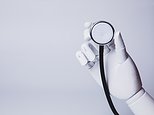Science
AI Revolutionizes Medicine as Healthcare Struggles with Workloads

The integration of artificial intelligence (AI) in healthcare is becoming increasingly crucial as a new book highlights challenges within the current medical system. A significant portion of doctors, nearly 50%, report being unable to manage their workloads effectively. Furthermore, many of the skills they acquire during medical school often become outdated by the time they complete their training.
Long wait times, labor strikes, and a growing number of negligence claims have put immense pressure on healthcare systems, particularly in the United Kingdom. The situation underscores the urgent need for innovation and improvement in medical practices. The recent publication addresses how AI can offer more reliable and trustworthy solutions to these ongoing issues.
The Role of AI in Modern Medicine
AI technology holds the potential to transform various aspects of healthcare delivery. By streamlining administrative processes and assisting in diagnostics, AI can help alleviate some of the burdens faced by medical professionals. For instance, AI algorithms can analyze patient data quickly, providing insights that may take human practitioners much longer to gather.
According to the book, AI could enhance patient care by allowing doctors to focus more on direct interactions with patients rather than administrative tasks. This shift could lead to improved outcomes and greater patient satisfaction. The emphasis is on ensuring that AI systems are developed and implemented with a focus on ethical practices and patient safety.
Challenges in the Current Healthcare System
The healthcare system is currently grappling with a myriad of issues that hinder its effectiveness. Strikes by healthcare workers have drawn attention to the need for better working conditions and support for staff. In addition, patients face long wait times for appointments and treatments, leading to frustration and, in some cases, detrimental health outcomes.
The book highlights that many doctors feel ill-equipped to deal with their workloads, resulting in burnout and decreased quality of care. The notion that medical education becomes outdated so quickly raises concerns about the continual training of healthcare providers.
In addressing these challenges, the authors stress the importance of leveraging AI to enhance efficiency and accuracy in medical practices. They argue for a collaborative approach between technology and healthcare professionals to ensure that the implementation of AI complements human expertise rather than replaces it.
The potential for AI to assist in monitoring patient health, predicting outcomes, and even providing personalized treatment options is significant. By embracing these innovations, the healthcare sector can move towards a model that prioritizes both efficiency and patient-centered care.
As the discussion surrounding AI in healthcare continues, stakeholders across the industry are urged to engage in meaningful dialogue about the future of medicine. The integration of AI could serve as a vital step toward addressing the pressing issues facing the healthcare system today.
This ongoing transformation calls for an open-minded approach and a commitment to harnessing technology to improve the quality of care for all patients, ensuring that the future of medicine is not only advanced but also sustainable.
-

 Entertainment1 month ago
Entertainment1 month agoKim Cattrall Posts Cryptic Message After HBO’s Sequel Cancellation
-

 Entertainment2 weeks ago
Entertainment2 weeks agoMasterChef Faces Turmoil as Tom Kerridge Withdraws from Hosting Role
-

 Entertainment4 weeks ago
Entertainment4 weeks agoAldi Launches Cozy Autumn Fragrance Range Ahead of Halloween
-

 Entertainment2 months ago
Entertainment2 months agoSpeculation Surrounds Home and Away as Cast Departures Mount
-

 Entertainment1 month ago
Entertainment1 month agoMarkiplier Addresses AI Controversy During Livestream Response
-

 Health1 month ago
Health1 month agoWigan and Leigh Hospice Launches Major Charity Superstore
-

 Lifestyle2 weeks ago
Lifestyle2 weeks agoSummer Flags Spark Controversy Across England as Patriotism Divides
-

 Science1 month ago
Science1 month agoAstronomers Unveil New Long-Period Radio Transient ASKAP J1448−6856
-

 Entertainment4 weeks ago
Entertainment4 weeks agoLas Culturistas Awards Shine with Iconic Moments and Star Power
-

 Entertainment3 weeks ago
Entertainment3 weeks agoTurmoil in Emmerdale: Charity Dingle and Mack’s Relationship at Risk
-

 Lifestyle1 month ago
Lifestyle1 month agoTesco Slashes Prices on Viral Dresses in Summer Clearance Sale
-

 Politics2 months ago
Politics2 months agoPlane Crash at Southend Airport Claims Four Lives After Takeoff




















